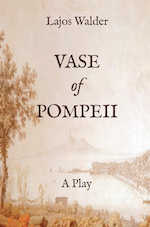(February 2017)
"Lajos Walder is [a] name you should know ..."
—DON PATERSON
"Walder (1913–1945) might be a little-known mid-20th century Hungarian poet, but that has little to do with his talent ... Nothing is too big or too small to be noticed, and this transcendence of self allows Walder to make grand gestures without sounding archaic or pompous ... Walder endows smallness with heavy meaning ..."
—PUBLISHERS WEEKLY
"Lajos Walder’s poetry, modern and urgent, committed to its craft, written against its own times, composed on the run, touched by personal and larger histories, is an example of the white-hot way poetry can emerge from a life."
—Kevin Brophy, TEXT
Available as an eBook at Smashwords, Amazon, Barnes & Noble, Kobo, Apple, Blio, and other fine eBook retailers.
ISBN 978-1-935830-37-5 (print)
ISBN 978-1-935830-40-5 (ebook)
On his sixtieth birthday, Monsieur Lebordin, a world-renowned scholar and antiquities expert, suffers a heart attack while alone in his one-room apartment in Paris, and is visited by the mysterious stranger Angela, who, as we find out in the course of the play, is not at all who she appears to be ... As Lebordin reminisces about his life—his loveless marriage and failure as a father, opportunities missed and roads not taken, the price of professional success—it is the Vase of Pompeii that moves center stage: brought to him years ago by a young and beautiful American millionairess to be authenticated, it embodies the gift of love he rejected and the life he did not live ... Set in 1930s France, Vase of Pompeii is a Symbolist masterpiece, social commentary (applying as much to our own time as to pre-war Europe) masquerading as bourgeois tragedy.
REVIEWS
"Walder (1913–1945) might be a little-known mid-20th century Hungarian poet, but that has little to do with his talent ... Nothing is too big or too small to be noticed, and this transcendence of self allows Walder to make grand gestures without sounding archaic or pompous ... Walder endows smallness with heavy meaning ..."
“Why might we want to read these poems from a young poet of the 1930s in Europe? Firstly, we have a chance to hear the voice of a poet apparently too dangerously outspoken to be allowed to be heard in his lifetime ... But most importantly, Lajos Walder’s poetry, modern and urgent, committed to its craft, written against its own times, composed on the run, touched by personal and larger histories, is an example of the white-hot way poetry can emerge from a life. This is an exciting book to read.”
"Rarely have I been smitten by a poet, but in Lajos Walder (1913-1945) I have been swept off my feet. His [is] the art of a rare mind, who surveyed his times with an awareness as dark as Franz Kafka s and a humour as light as Milan Kundera's ..."
"Lajos Walder has neither ancestor nor partner in Hungarian literature. He is a poet, without a doubt a lyricist through and through, yet one whose every line and every poetic breath is pure heresy, pure rebellion against accustomed forms of poetry."
"Lajos Walder was the most credible voice to express the times between the two world wars. Without this artist s entirely individualistic voice, the overall picture of that period is incomplete."
Translated by Agnes Walder
ISBN 978-1-935830-37-5 (print)
ISBN 978-1-935830-40-5 (eBook)
Publication Date: February 10, 2017
On his sixtieth birthday, Monsieur Lebordin, a world-renowned scholar and antiquities expert, suffers a heart attack while alone in his one-room apartment in Paris, and is visited by the mysterious stranger Angela, who, as we find out in the course of the play, is not at all who she appears to be ... As Lebordin reminisces about his life—his loveless marriage and failure as a father, opportunities missed and roads not taken, the price of professional success—it is the Vase of Pompeii that moves center stage: brought to him years ago by a young and beautiful American millionairess to be authenticated, it embodies the gift of love he rejected and the life he did not live ... Set in 1930s France, Vase of Pompeii is a Symbolist masterpiece, social commentary (applying as much to our own time as to pre-war Europe) masquerading as bourgeois tragedy.
COMING SOON!

- All Titles A-Z
- 17 Vorurteile, die wir Deutschen ...
- A Moment More Sublime: A Novel
- Become a Message: Poems
- Below Zero: A Play
- Channel Swimmer: A Novel
- Descartes’ Devil: Three Meditations
- Fatal Numbers: Why Count on Chance
- Gespräch über Deutschland. Mit zwei Essays
- Health Is in Your Hands: Jin Shin Jyutsu — Practicing the Art of Self-Healing (with 51 Flash Cards for the Hands-on Practice of Jin Shin Jyutsu)
- High on Low: Harnessing the Power of Unhappiness
- Homo Conscius: A Novel
- In Praise of Weakness
- Mortal Diamond: Poems
- November Rose: A Speech on Death
- November-Rose: Eine Rede über den Tod
- Of Parents and Children
- On Dialogic Speech
- On Language & Poetry
- Összes Versei
- Passing Time: An Essay on Waiting
- Philosophical Fragments of a Contemporary Life
- Philosophical Truffles
- Spanish Light
- The Complete Plays of Lajos Walder
- The Complete Poems of Lajos Walder
- The DNA of Prejudice: On the One and the Many
- The Impostors: A Novel
- The Man Who Couldn't Stop Thinking: A Novel
- The Spectator: A Novel
- The Square Light of the Moon
- The Vocation of Poetry
- The Wisdom of Parenthood: An Essay
- The Zucchini Conspiracy: A Novel of Alternative Facts
- Tyrtaeus: A Tragedy
- Vase of Pompeii: A Play
- What We Gain As We Grow Older: On Gelassenheit
- Yoga for the Mind: A New Ethic for Thinking and Being & Meridians of Thought























